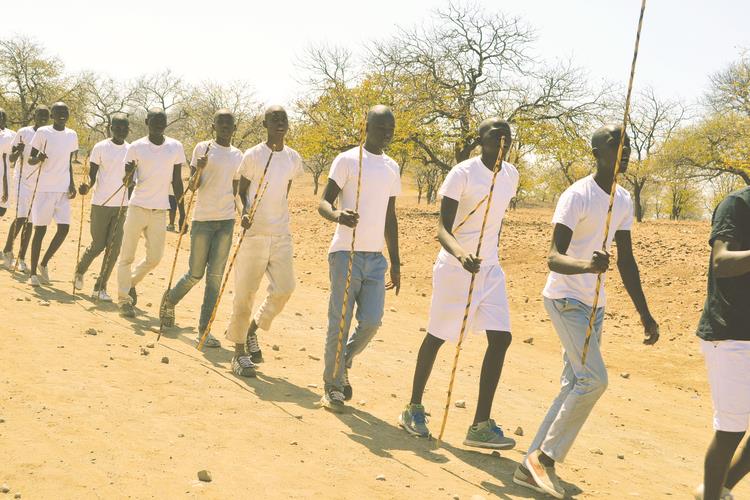Shangani villagers decry intrusion into culture


Part of the 2 411 Shangani circumcised males during a procession at Muhlanguleni Business Centre in Chiredzi South on Saturday
Walter Mswazi and Tawanda Mangoma
SHANGANI villagers in Chiredzi have raised concern over what they described as intrusion into their culture by health partners in circumcision practices. They accuse their partners of disclosing their guarded secrets during initiation. This comes after Zimbabwe has set a target of circumcising 1,3 million men between the ages of 13 to 29 by 2018.
At least 49 000 males received circumcision operations in July and August throughout the country this year.
Zimbabwe has embarked on a drive to circumcise men under the Voluntary Medical Male Circumcision programme which started in 2009.
Speaking on the sidelines of a graduation ceremony of 2 400 circumcision initiates at Mhlanguleni Business Centre in Chiredzi at the weekend, Headman Mupapa complained about lack of respect of their culture by Population Services International.
He threatened that they would stop health partners from working with them.
Headman Mupapa said PSI should not be involved in designing messages for the circumcision ceremony as some of the banners revealed their guarded secrets.
“We are not happy with the way our health partners, Population Service International (PSI) are doing things. They are intruding into llagers decry intrusion into culture our culture and that compromises our partnership with them.
“Our circumcision practice is censored but when what we do during initiation, is revealed we feel there is intrusion of our culture.
“The aspect of censorship will also be meaningless if our secrets are revealed. PSI has to stay away from our culture,” Headman Mupapa said.
He called on partners not to be actively involved in their graduation ceremonies as it devalues the Tshangani culture and rendering the initiation practice “useless”.
“Tshangani culture is a sacred especially when it comes to the male circumcision. What we do at the initiation and circumcision camps should not be revealed to anyone who is not circumcised, it is taboo.
“The messages, like, “Pinda MuSmart, Ngena kuSmart” violates our censorship policy. The messages inscribed on the banners should reflect our cultural norms and values without being intrusive,” he said.
Chiredzi RDC Ward 10 Councilor Leonard Makondo echoed the same sentiments said it was incumbent for the organisations to respect people’s cultures.
“Today it is our day of celebrating boys being initiated into full men. We should be running the show and not PSI. Our partners should play a passive role here.
“If they keep on interfering with our culture I think, we will be forced to cut the relationship and continue with our practices. They cannot lecture us anything about our culture, they have to listen to us.
“We now want only circumcised Tshangani doctors and nurses to be at our camps,” he said.
PSI deputy director clinical programme Dr Ngonidzashe Madidi, however, played down the villagers’ concern saying the organisation enjoys a symbiotic relationship with Tshangani chiefs who have given them the great light to operate.
“We have firstly consulted the chiefs. We started male circumcision surgeries in 2011 with Lemba people in Mberengwa, Tshangani people in Chiredzi and Xhosa people in Ntabazinduna,Bulawayo.
“On messages, it is only for this year that there are no messages written in Tshangani on their t-shirts. Previously we used to give initiates regalia with messages written in their native language. It is unfortunate this time the messages on banners are in English, IsiNdebele and Shona,” he said.
He, however, noted that they could reach their intended targets with enough medical personnel.
“We, however, trained nurses from Mwenezi and Chiredzi but we are still facing challenges to find doctors who are originally from the cultural groups as most of them are not operating in the country,” Dr Madidi said.
Meanwhile, National VMMC coordinator in the Ministry of Health and Child Care, Dr Sinokuthemba Xaba said the partnerships with traditional groups mainly in Chiredzi and Mberengwa had seen 49 000 people circumcised between July and August this year.
“Initially, for the period of July and August, we had anticipated to circumcise 60 000 people but from 2009 to June this year, we have attended to over 950 000 males,” he said.
Dr Xaba said they would look at having 80 percent of the male population in Zimbabwe to be circumcised after the 2018 deadline.





Comments